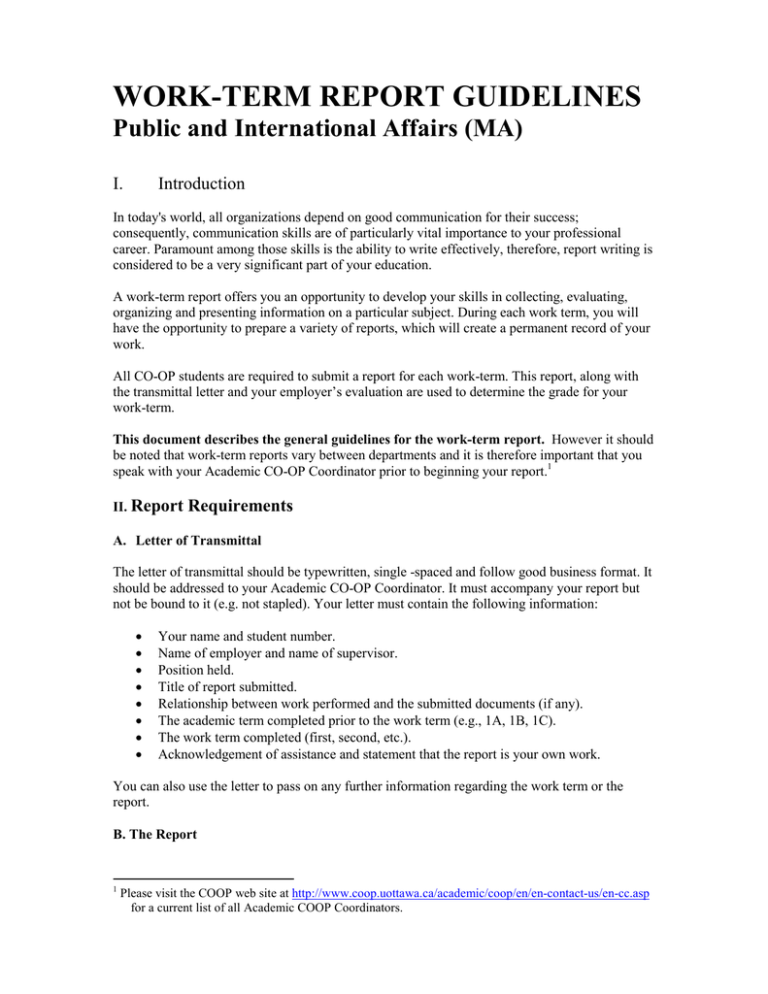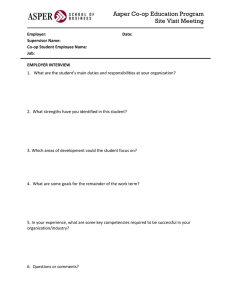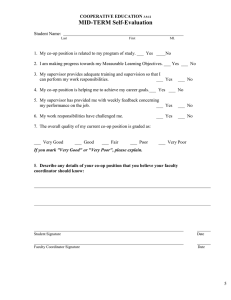work-term report guidelines - uOttawa CO
advertisement

WORK-TERM REPORT GUIDELINES Public and International Affairs (MA) I. Introduction In today's world, all organizations depend on good communication for their success; consequently, communication skills are of particularly vital importance to your professional career. Paramount among those skills is the ability to write effectively, therefore, report writing is considered to be a very significant part of your education. A work-term report offers you an opportunity to develop your skills in collecting, evaluating, organizing and presenting information on a particular subject. During each work term, you will have the opportunity to prepare a variety of reports, which will create a permanent record of your work. All CO-OP students are required to submit a report for each work-term. This report, along with the transmittal letter and your employer’s evaluation are used to determine the grade for your work-term. This document describes the general guidelines for the work-term report. However it should be noted that work-term reports vary between departments and it is therefore important that you speak with your Academic CO-OP Coordinator prior to beginning your report.1 II. Report Requirements A. Letter of Transmittal The letter of transmittal should be typewritten, single -spaced and follow good business format. It should be addressed to your Academic CO-OP Coordinator. It must accompany your report but not be bound to it (e.g. not stapled). Your letter must contain the following information: • • • • • • • • Your name and student number. Name of employer and name of supervisor. Position held. Title of report submitted. Relationship between work performed and the submitted documents (if any). The academic term completed prior to the work term (e.g., 1A, 1B, 1C). The work term completed (first, second, etc.). Acknowledgement of assistance and statement that the report is your own work. You can also use the letter to pass on any further information regarding the work term or the report. B. The Report 1 Please visit the COOP web site at http://www.coop.uottawa.ca/academic/coop/en/en-contact-us/en-cc.asp for a current list of all Academic COOP Coordinators. i) Planning The goal of the CO-OP report is to help you define your major paper. Thus both the CO-OP assignment and the report itself should be aimed at defining the research area. Keeping this in mind will facilitate your progress through the API program. Very early in the work term, you should meet with your work supervisor to discuss the report requirements of your program. This will enable you to decide which type of report is the most appropriate (see below). If necessary you may consult your Academic CO-OP Coordinator. Ask your supervisor whether any of your work will be of a proprietary nature. Once you have decided on a suitable topic, draw up a schedule for the completion of your report. Don't wait until the last minute, as a good report involves planning; the work report must be part of the duties of your work term. You may want to consult the examples of outstanding reports available on our web site at http://www.coop.uottawa.ca/academic/coop/en/en-coopstudents/en-wt-guidelines.asp. Make use of the library for your research or for books on report writing; a few titles are suggested in APPENDIX A. Finally, take printing time into consideration; some students wait until the last day to print their report and then find that technical problems prevent them from printing it. Such an excuse for lateness is not acceptable. ii) Type of Report In consultation with your Academic CO-OP Coordinator, you can choose one of the following forms of report. TYPE I TYPE II TYPE III During the course of a work term, some employers expect the student to prepare written reports on their work. These should be prepared for the employer according to the employer's required format. The employer may not require reports; nevertheless you may wish to write one, which is completely related to your activities during the work term (although it should not become a diary of your daily activities). If the nature of the work does not lend itself to one of the other forms, you should discuss a topic with your Academic CO-OP Coordinator and agree on a subject on which you will write a technical report. Such an agreement should be arrived at early in the term and you should confirm it by submitting an outline to your Academic CO-OP Coordinator. In such a case, some or all of the reports may be submitted to meet the work report requirements. If you choose to do so, you must discuss it with your Academic COOP Co-ordinator to ensure that this is acceptable and obtain his or her approval in writing. You should describe the major tasks you completed. If you were in a project-oriented position, you should describe these projects. Whenever possible it is advisable to give a detailed write-up of one project and briefly describe the other projects. You could also show your understanding of the purpose of the work and what you have learned. The introduction of your report should contain a brief description of your work environment. The topic you choose need not be an original one but the report must be your own work. TYPE II and III reports should be prepared on your own time. Employers want to read your report before you submit it to the University. Therefore for all types of reports, you must submit a copy of it to your employer one week before the end of your work term. iii) Confidential Reports It is recommended that students choose topics and material, which do not contain any information of a proprietary nature. If this is not possible, then you must inform your Academic CO-OP Coordinator at least six weeks prior to the Co-op deadline for submitting the report. If your report is confidential, your employer must evaluate the report and submit a signed evaluation form (see appendix B). This form must be submitted with your letter of transmittal by the deadline for submitting work-term reports. The only exceptions to this will be for programs with specific guidelines regarding confidential reports. iv) Language As for any course at the University of Ottawa, you may write the letter of transmittal and your report in English or French. However, for a TYPE I report the employer determines the language. We recommend that you use the language in which you are more comfortable, since your report will be also graded on style, grammar and spelling. It is always preferable to ask for advice on the language from your supervisor and Academic CO-OP Coordinator before starting to write your report. v) Format TYPE I REPORTS TYPE II & III REPORTS For TYPE I reports, check the required format with your employer. The report should be bound and include a title page, a table of contents and an introduction. This introduction should summarize your tasks and responsibilities and list the skills and other benefits for professional development gained during the term. It can also serve to introduce the different individual reports. The introduction should normally be one to two pages in length. For all other reports, the following format is required: – title page – table of contents – summary or abstract – introduction – body – conclusion – bibliography – appendix (optional) Please note the following additional requirements: • The report must be bound and held together with a binding mechanism. Reports stapled at the top are not acceptable; • All pages should be numbered (including any appendices); • References to other publications or to appendices should be precise (page numbers, etc.); • Avoid adding generic descriptions of the company or products unless relevant to your topic; • Add a glossary if the text includes numerous technical terms; • The appendix may contain such items as lengthy tables, computer code or maps; • Use of figures, graphs, or histograms may add clarity and shorten your text; • Organize your report in sections and use headings; • Use a font size of 12 or 14 points and line spacing of 1.5. vi) Length The length of your report should be such as to adequately cover the chosen topic. Usually a report is between 10 to 20 pages long, excluding appendices. vii) Due Date Your work-term report must be submitted to your employer for his or her approval one week before the end of your work term. The accompanying letter and work-term report (or report evaluation form filled out by your employer if your report is confidential) are usually due at the Co-operative Education Programs Office by the second Friday after classes resume. Be sure to check under “Upcoming Key Dates” on the CO-OP Programs Web site for the exact date. You must also complete the “STUDENT EVALUATION” in COOP Navigator by this date. Be sure to SAVE the evaluation once you have completed it. You will be notified of the exact date each term. Do not submit your work-term report to your CO-OP academic coordinator. Late reports will not be accepted. viii) Audience (for Type II and III reports) Try to target your report to be understood by your student peers. Avoid using too much specialized jargon with which you have become familiar during the work term and which might be unfamiliar to your peers. ix) Evaluation The Academic CO-OP Coordinator will evaluate both the letter of transmittal and the work term report. The content, style and grammar, as well as organization and presentation, of your report will be evaluated. The form used for confidential report evaluation (appendix H) is also a guideline for the evaluation of all types of reports. If your report is judged unsatisfactory, you may be given an opportunity to submit a revised version within a prescribed period of time. Reports are usually corrected by mid-semester. Please see your departments at that time as the reports are not returned to the CO-OP office. APPENDIX A REFERENCES Gibaldi, Joseph, 1999. MLA Handbook for Writers of Research Papers. Modern Language Association of America, New York. Turabian, Kate L., 1996. Manual for Writers of Term Papers, Theses and Dissertation, 6th edition. University of Chicago Press, Chicago There are a number of books on business report writing on the 4th floor at the Morisset Library. (They begin with the call number HF 57.) Books on technical writing can be found on the 6th floor. (They begin with the call number T11...) Please visit our Web site at http://www.coop.uottawa.ca/academic/coop/en/en-coopstudents/en-wt-guidelines.asp for samples of work-term reports for all CO-OP programs. Appendix B EVALUATION OF CONFIDENTIAL WORK-TERM REPORT Note: The CO-OP student’s supervisor must complete this form if the work-term report contains proprietary information and cannot be released for evaluation. It must be submitted by the deadline for submission of the workterm report. Program of study: Student’s name: CO-OP employer: Evaluated by: Work term: 1 Phone no.: st 2 nd Criteria Presentation • Letter of submittal • Front cover • Title page • Table of contents • List of tables and appendices • Overall appearance Structure • Summary/abstract • Introduction • Conclusions • Recommendations • Appendices • References Literary quality • Grammar • Spelling • Clarity • Style Quality of subject matter • Relevance of ideas/solutions presented • Quality of analysis • Understanding and depth of the concepts discussed • Understanding of significance of the work within the employer’s environment Overall appraisal Signature of evaluator: Pass 3 rd 4th E = excellent G = good F = fair U = unsatisfactory 5th Comments _________ _________ _________ _________ _________ _________ _________ _________ _________ _________ _________ _________ _________ _________ _________ _________ _________ _________ _________ _________ Fail Resubmit _________ Date:

